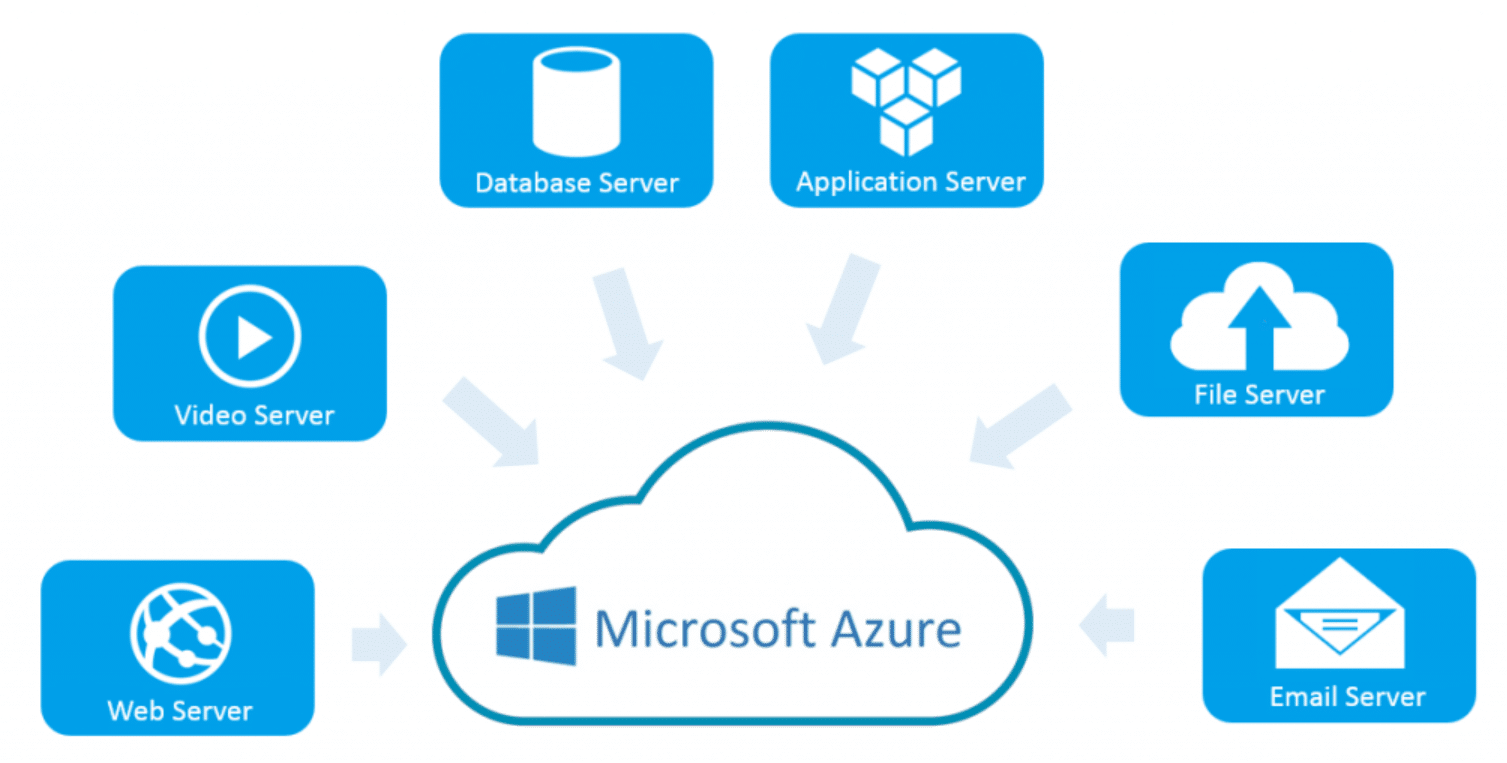Azure cloud server – In today’s fast-paced digital landscape, businesses are increasingly turning to cloud computing to scale operations, enhance flexibility, and drive innovation. Microsoft Azure stands out as one of the most widely adopted cloud platforms, offering a robust suite of services for businesses of all sizes. Among its many offerings, Azure cloud servers are at the heart of the platform, providing the computing power and scalability required to run everything from simple web apps to complex enterprise solutions.
In this article, we will explore the concept of Azure cloud servers, their key features, benefits, and how organizations can leverage them for a wide range of applications. We will also dive into use cases, pricing models, security measures, and future trends in Azure cloud infrastructure.

What Is Azure Cloud Server?
Azure cloud servers are virtual machines (VMs) provided by Microsoft Azure, which run on the infrastructure of Microsoft’s global data centers. These servers are part of a larger ecosystem that enables businesses to deploy and manage applications, websites, and services in a secure and scalable environment.
Unlike traditional on-premise servers that require significant capital investment and maintenance, Azure cloud servers provide an on-demand, pay-as-you-go model. This allows businesses to easily scale up or down based on demand without worrying about hardware provisioning, maintenance, or data center management.
Azure cloud servers offer a variety of operating systems and configurations, ranging from general-purpose virtual machines to specialized instances optimized for compute-heavy workloads, high-performance applications, or data-intensive services.
Key Features of Azure Cloud Servers
1. Scalability
One of the most compelling features of Azure cloud servers is their scalability. With Azure, businesses can dynamically adjust their resources based on their needs. Whether you need a single VM for a small project or hundreds of servers to handle massive traffic, Azure allows you to scale your infrastructure automatically.
-
Horizontal Scaling: Increase or decrease the number of VMs to meet fluctuating demand.
-
Vertical Scaling: Adjust the resources (CPU, memory, storage) of an existing VM without downtime.
2. Flexibility
Azure cloud servers offer a high level of flexibility in terms of configurations. Businesses can choose from a wide range of virtual machine sizes, operating systems, and pre-built images, including Windows, Linux, and specialized configurations for high-performance computing, GPU workloads, and machine learning.
-
Windows and Linux Support: Azure supports both Windows and Linux-based VMs, ensuring compatibility with a wide range of applications and services.
-
Custom Images: Users can create custom images tailored to their specific needs, making it easier to replicate environments and streamline deployments.
3. High Availability
Azure cloud servers are designed to ensure high availability and minimize downtime. With a global network of data centers, Azure offers redundancy, failover capabilities, and fault tolerance. Azure’s Availability Sets and Availability Zones provide a reliable infrastructure that ensures applications continue running even in the face of hardware failure.
-
Availability Sets: Distribute VMs across multiple physical servers to minimize the impact of failures.
-
Availability Zones: Ensure higher fault tolerance by replicating services across physically separated locations within a region.
4. Security
Microsoft Azure places a strong emphasis on security. Azure cloud servers benefit from multi-layered security protections, including network firewalls, encryption, identity management, and more. Azure provides robust tools to ensure that data is protected both at rest and in transit.
-
Azure Security Center: A unified security management system to monitor, assess, and respond to security threats.
-
Encryption: Data is encrypted by default, using advanced encryption protocols such as AES-256 for storage and SSL/TLS for data in transit.
5. Integrated Services
Azure cloud servers integrate seamlessly with other Azure services, such as databases, networking, and AI tools. This allows businesses to build end-to-end solutions entirely within the Azure ecosystem. Azure’s integration with services like Azure Active Directory (AD), Azure SQL Database, and Azure Kubernetes Service enables organizations to deploy, monitor, and scale applications with minimal friction.
-
Azure Active Directory (AD): A cloud-based identity and access management service that helps secure applications and resources.
-
Azure Kubernetes Service (AKS): A managed Kubernetes service to deploy, manage, and scale containerized applications on Azure.
6. Global Reach
With over 60 regions worldwide, Azure offers unmatched global coverage. Organizations can deploy their applications and services in data centers closer to their users, minimizing latency and improving user experience. The geographic distribution of Azure’s data centers also allows businesses to comply with regional data sovereignty laws and regulations.
Benefits of Azure Cloud Servers
1. Cost-Effectiveness
Azure cloud servers offer a pay-as-you-go pricing model, which means businesses only pay for the resources they consume. There are no upfront capital expenditures for hardware, and companies avoid the ongoing maintenance costs of on-premise infrastructure.
-
Azure Reserved Instances: For long-term workloads, businesses can commit to using Azure resources for 1 or 3 years and receive significant discounts.
-
Azure Spot VMs: Cost-effective VMs that allow businesses to take advantage of unused capacity at a reduced price.
2. Performance
Azure cloud servers are optimized for performance, with options for high-speed processors, large memory configurations, and high-throughput networking. Azure provides specialized virtual machines for demanding workloads, including those requiring high-performance computing (HPC), big data analytics, and graphics-intensive tasks.
-
Azure Premium Storage: A high-performance storage option for workloads that require low latency and high throughput.
-
GPU-Enabled VMs: For machine learning, data science, and graphics rendering applications.
3. Compliance and Regulatory Support
Azure complies with numerous industry standards and certifications, making it an ideal choice for businesses in regulated industries such as healthcare, finance, and government. Azure provides built-in tools to help companies meet compliance requirements and maintain regulatory standards.
-
ISO 27001, SOC 1, SOC 2, and HIPAA certifications.
-
Compliance Manager: Helps organizations track and manage compliance with industry regulations.
4. Ease of Management
Azure provides a comprehensive set of tools to manage and monitor cloud servers, including the Azure Portal, Azure CLI, and Azure PowerShell. These tools enable administrators to easily configure, deploy, and monitor their cloud servers, as well as automate common tasks.
-
Azure Resource Manager: A tool to organize and manage resources across your Azure environment.
-
Azure Monitor: Provides insights into the health, performance, and availability of your applications and infrastructure.
Use Cases of Azure Cloud Servers
1. Web Hosting and Application Deployment
Azure cloud servers are ideal for hosting websites and web applications. Whether you’re running a simple blog or a complex e-commerce platform, Azure provides the scalability and performance needed to deliver a seamless user experience.
2. Business Applications
Many businesses deploy applications like customer relationship management (CRM), enterprise resource planning (ERP), and content management systems (CMS) on Azure cloud servers. These systems benefit from the high availability, security, and integration with other Azure services.
3. Big Data and Analytics
Azure cloud servers are used to run big data workloads, process large datasets, and perform data analytics. Services like Azure Data Lake, HDInsight, and Azure Synapse Analytics allow businesses to ingest, process, and analyze vast amounts of data to derive actionable insights.
4. Disaster Recovery and Backup
Azure cloud servers are frequently used for disaster recovery (DR) and business continuity. Businesses replicate their on-premise infrastructure to Azure to ensure that critical services remain operational in the event of hardware failure or natural disasters.
5. Development and Testing
Developers use Azure cloud servers to spin up development and testing environments quickly. Azure’s flexible VMs allow for fast provisioning of environments, enabling continuous integration and delivery (CI/CD) practices.
Pricing Models of Azure Cloud Servers
Azure offers several pricing models for cloud servers:
1. Pay-as-You-Go (Consumption-Based)
This is the most flexible pricing model. Businesses are charged based on their actual resource usage, including compute, storage, and data transfer.
2. Azure Reserved Instances
This model allows businesses to reserve virtual machines for one or three years at a discounted rate. It is ideal for predictable, long-term workloads.
3. Azure Spot Instances
These instances allow businesses to purchase unused capacity at a significant discount. Spot instances are ideal for fault-tolerant applications that can handle interruptions.
4. Azure Hybrid Benefit
This benefit allows businesses with existing on-premises Windows Server or SQL Server licenses to save on Azure VMs, reducing costs by up to 40%.
Security of Azure Cloud Servers
Azure cloud servers come with a robust suite of security features designed to protect data and applications. These include:
-
Network Security: Use of firewalls, VPNs, and private networks to safeguard data and services.
-
Identity and Access Management (IAM): Azure Active Directory (AD) allows businesses to manage user roles and permissions securely.
-
Data Encryption: All data stored in Azure is encrypted using industry-standard encryption protocols.
-
Azure Security Center: Provides a unified view of security policies, vulnerabilities, and threats.
Conclusion
Azure cloud servers provide organizations with an efficient, flexible, and secure solution to deploy, manage, and scale their workloads. With features like scalability, flexibility, high availability, and robust security, Azure empowers businesses to take full advantage of cloud computing without the complexity and cost of managing physical servers.
Whether you’re running a website, deploying business applications, or leveraging big data, Azure cloud servers are a reliable and powerful solution for all your computing needs. By integrating with other Azure services, businesses can build end-to-end solutions that drive growth, improve efficiency, and deliver exceptional customer experiences.
As the demand for cloud services continues to grow, Azure remains at the forefront of innovation, providing businesses with the tools they need to thrive in a competitive digital world.
